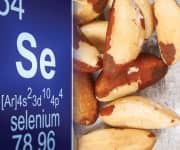Life Extension Magazine®
A landmark clinical trial found that death due to cardiovascular causes was reduced by more than half in older people who took selenium and coenzyme Q10 (CoQ10) for a period of four years.
This protection was found a full five years after the selenium and CoQ10 supplementation had stopped. This means the benefit continued long after supplementation ended.1
A follow-up analysis from the same trial demonstrated that the life-saving protection continued for over a decade after the supplement period concluded.2,3
Follow up studies show benefits in those with existing heart disease and diabetes.2-12
These results add powerful evidence to the link between selenium and coenzyme Q10 and heart health.
Reductions in Cardiovascular Death
In the initial study, researchers from Sweden chose healthy adults between the ages of 70 and 88 years old. Subjects were randomized to receive either a combination of 200 mg of coenzyme Q10 and 200 mcg of selenium daily or a placebo for four years.
During the follow-up period of more than five years after the end of the nutrient intervention, 12.6% of those who had received the placebo suffered a cardiovascular death. But only 5.9% of those in the selenium +CoQ10 group did—less than half the mortality rate.1
Results from two subsequent additional follow-ups have been remarkable.
Ten years after the supplementation ended, the risk of death due to cardiovascular disease was still 49% lower in those who had received the nutrients.3 This result was true even for subjects who had existing heart disease.
After 12 years, the benefit continued; the risk of death was 41% lower in those who had received selenium and CoQ10.2
The benefits remained consistent when focusing only on subjects who had existing heart disease, diabetes, or high blood pressure.
Improved Markers of Health
Slashing the rate of cardiovascular mortality is impressive enough.
But in the last few years, several in-depth analyses of the original trial have determined that selenium and CoQ10 also improved several markers of cardiovascular and general health, including:
- Quality of life. In those given selenium and CoQ10, measures of mental and physical quality of life were maintained better than in those who took the placebo.12
- Hospitalization. Subjects who received the two nutrients spent a remarkable 246 fewer days, on average, in the hospital than placebo recipients.12
- Heart function. Those receiving the selenium and CoQ10 had significantly better cardiac function (measured by an echocardiogram) than placebo recipients.1
- Fibrosis. Fibrosis, the development of rigid, scarred tissue, is a common element of many chronic diseases, including in the heart. Those receiving the supplementation had a reduction in fibrosis for biomarkers compared to those taking a placebo.6
- Oxidative Stress and Inflammation. Oxidative stress and chronic inflammation are significant contributors to many forms of age-related disease. In this study, several markers o oxidative stress and chronic inflammation were decreased in those taking the nutrients.9-11,13
- Clot Formation. D-dimers are protein fragments produced by blood clots. Elevated levels in the blood correlate with cardiovascular disease. Taking selenium and CoQ10 was found to prevent an increase in D-dimers.7
- Glycation. Blood sugar can attach to proteins, lipids, or DNA and damage them. This process is known as glycation, and it is a contributor to most chronic diseases. Fructosamine, a compound found in blood that is a marker of glycation, is associated with risk of cardiovascular disease.14-19 Fructosamine was reduced in those receiving the combination of nutrients.5
- Cardiovascular and Pulmonary Risk. High levels of the protein NT-proBNP in the blood is a marker of heart failure. It can also be an indicator of coronary and valvular heart disease, pulmonary hypertension, pulmonary embolism, and stroke risk.20-22 Selenium and CoQ10 intake was associated with reduction in NT-proBNP levels.1
These results clearly show that taking selenium and CoQ10 did more than reduce death from cardiovascular causes. It also improved many measures of heart and overall health.
What you need to know
A Combination that Cuts Cardiovascular Death
- Selenium and coenzyme Q10 (CoQ10) are nutrients that prevent damaging oxidative stress. Coenzyme Q10 plays a vital role in mitochondrial health to maintain cellular energy.
- A landmark study in Sweden showed that older individuals who took 200 mg of coenzyme Q10 and 200 mcg of selenium daily for four years had dramatically lower cardiovascular-related deaths compared to those who received a placebo, by more than half!
- A follow-up showed that the group taking the nutrients still had lower rates of death 12 years after the supplement intervention ended.
- Several sub-studies have shown that the four-year combination of CoQ10 and selenium also improved quality of life, heart function, and biomarkers of heart and blood vessel health.
Statin Drugs Deplete CoQ10
Many people take statin drugs to lower cholesterol and reduce risk of cardiovascular disease.
But that comes with a problem: Statin drugs can deplete coenzyme Q10 levels.29,30 That’s because the enzyme that statins inhibit is the same enzyme that produces a compound required to make new CoQ10 in the body.
Since low CoQ10 production may raise the risk of heart disease, those taking statins should be particularly concerned with their blood levels of CoQ10.
How Selenium and CoQ10 Help the Heart
On their own, selenium and coenzyme Q10 each helps protect the heart.
Several studies have shown that there is a link between cardiovascular disease and lower blood levels of both nutrients.23-27
Selenium and CoQ10 are involved in the body’s defenses against oxidative stress, a major contributor to cardiovascular disease. And CoQ10 is crucial for the proper function of the cell’s powerhouses, the mitochondria.28
Selenium is important for different enzymes, including glutathione peroxidase and thioredoxin reductase. These are both critical parts of the body’s built-in antioxidant system that shields against oxidative damage.5
Selenium and CoQ10 may represent a powerful duo for the prevention of heart disease and reduction in cardiovascular deaths.
Summary
A clinical trial showed that a combination of selenium and coenzyme Q10, taken for four years, reduced cardiovascular death in a group of older adults, even five years past the end of the intervention.
Beyond that, 12 years of follow-up have now demonstrated that the protection against cardiovascular death and disease continued for over a decade after the supplementation period ended.
Analyses show that selenium and CoQ10 not only reduced mortality, but also reduced hospitalizations for heart disease, improved quality of life, boosted heart function, decreased inflammation, and improved other markers of cardiovascular and general health.
If you have any questions on the scientific content of this article, please call a Life Extension Wellness Specialist at 1-866-864-3027.
References
- Alehagen U, Johansson P, Bjornstedt M, et al. Cardiovascular mortality and N-terminal-proBNP reduced after combined selenium and coenzyme Q10 supplementation: a 5-year prospective randomized double-blind placebo-controlled trial among elderly Swedish citizens. Int J Cardiol. 2013 Sep 1;167(5):1860-6.
- Alehagen U, Aaseth J, Alexander J, et al. Still reduced cardiovascular mortality 12 years after supplementation with selenium and coenzyme Q10 for four years: A validation of previous 10-year follow-up results of a prospective randomized double-blind placebo-controlled trial in elderly. PLoS One. 2018;13(4):e0193120.
- Alehagen U, Aaseth J, Johansson P. Reduced Cardiovascular Mortality 10 Years after Supplementation with Selenium and Coenzyme Q10 for Four Years: Follow-Up Results of a Prospective Randomized Double-Blind Placebo-Controlled Trial in Elderly Citizens. PLoS ONE. 2015 12/01
- Alehagen U, Aaseth J. Selenium and coenzyme Q10 interrelationship in cardiovascular diseases--A clinician’s point of view. J Trace Elem Med Biol. 2015;31:157-62.
- Alehagen U, Aaseth J, Alexander J, et al. Supplemental selenium and coenzyme Q10 reduce glycation along with cardiovascular mortality in an elderly population with low selenium status - A four-year, prospective, randomised, double-blind placebo-controlled trial. J Trace Elem Med Biol. 2020 May 4;61:126541.
- Alehagen U, Aaseth J, Alexander J, et al. Less fibrosis in elderly subjects supplemented with selenium and coenzyme Q10-A mechanism behind reduced cardiovascular mortality? Biofactors. 2018 Mar;44(2):137-47.
- Alehagen U, Aaseth J, Lindahl TL, et al. Dietary Supplementation with Selenium and Coenzyme Q10 Prevents Increase in Plasma D-Dimer While Lowering Cardiovascular Mortality in an Elderly Swedish Population. Nutrients. 2021 Apr 17;13(4).
- Alehagen U, Alexander J, Aaseth J. Supplementation with Selenium and Coenzyme Q10 Reduces Cardiovascular Mortality in Elderly with Low Selenium Status. A Secondary Analysis of a Randomised Clinical Trial. PLoS One. 2016;11(7):e0157541.
- Alehagen U, Alexander J, Aaseth J, et al. Decrease in inflammatory biomarker concentration by intervention with selenium and coenzyme Q10: a subanalysis of osteopontin, osteoprotergerin, TNFr1, TNFr2 and TWEAK. J Inflamm (Lond). 2019;16:5.
- Alehagen U, Johansson P, Aaseth J, et al. Significant Changes in Metabolic Profiles after Intervention with Selenium and Coenzyme Q10 in an Elderly Population. Biomolecules. 2019 Sep 30;9(10).
- Alehagen U, Lindahl TL, Aaseth J, et al. Levels of sP-selectin and hs-CRP Decrease with Dietary Intervention with Selenium and Coenzyme Q10 Combined: A Secondary Analysis of a Randomized Clinical Trial. PLoS One. 2015;10(9):e0137680.
- Johansson P, Dahlstrom O, Dahlstrom U, et al. Improved Health-Related Quality of Life, and More Days out of Hospital with Supplementation with Selenium and Coenzyme Q10 Combined. Results from a Double Blind, Placebo-Controlled Prospective Study. J Nutr Health Aging. 2015 Nov;19(9):870-7.
- Alehagen U, Johansson P, Aaseth J, et al. Significant changes in circulating microRNA by dietary supplementation of selenium and coenzyme Q10 in healthy elderly males. A subgroup analysis of a prospective randomized double-blind placebo-controlled trial among elderly Swedish citizens. PLoS One. 2017;12(4):e0174880.
- Browner WS, Pressman AR, Lui LY, et al. Association between serum fructosamine and mortality in elderly women: the study of osteoporotic fractures. Am J Epidemiol. 1999 Mar 1;149(5):471-5.
- Malmstrom H, Walldius G, Grill V, et al. Fructosamine is a useful indicator of hyperglycaemia and glucose control in clinical and epidemiological studies—cross-sectional and longitudinal experience from the AMORIS cohort. PLoS One. 2014;9(10):e111463.
- Malmstrom H, Walldius G, Grill V, et al. Fructosamine is a risk factor for myocardial infarction and all-cause mortality - Longitudinal experience from the AMORIS cohort. Nutr Metab Cardiovasc Dis. 2015 Oct;25(10):943-50.
- Selvin E, Rawlings AM, Grams M, et al. Fructosamine and glycated albumin for risk stratification and prediction of incident diabetes and microvascular complications: a prospective cohort analysis of the Atherosclerosis Risk in Communities (ARIC) study. Lancet Diabetes Endocrinol. 2014 Apr;2(4):279-88.
- Selvin E, Rawlings AM, Lutsey PL, et al. Fructosamine and Glycated Albumin and the Risk of Cardiovascular Outcomes and Death. Circulation. 2015 Jul 28;132(4):269-77.
- Kim CS, Park S, Kim J. The role of glycation in the pathogenesis of aging and its prevention through herbal products and physical exercise. J Exerc Nutrition Biochem. 2017 Sep 30;21(3):55-61.
- Castelnuovo AD, Veronesi G, Costanzo S, et al. NT-proBNP (N-Terminal Pro-B-Type Natriuretic Peptide) and the Risk of Stroke. Stroke. 2019;50(3):610-7.
- Machado M, Falcão LM, Ravara L. The clinical role of natriuretic peptides--importance of BNP and NT-proBNP. Implications in heart failure and acute coronary syndrome. Rev Port Cardiol. 2004 Jul-Aug;23(7-8):1005-32.
- Available at: https://www.uptodate.com/contents/natriuretic-peptide-measurement-in-non-heart-failure-settings. Accessed November 19, 2021.
- Alehagen U, Johansson P, Bjornstedt M, et al. Relatively high mortality risk in elderly Swedish subjects with low selenium status. Eur J Clin Nutr. 2016 Jan;70(1):91-6.
- Eaton CB, Abdul Baki AR, Waring ME, et al. The association of low selenium and renal insufficiency with coronary heart disease and all-cause mortality: NHANES III follow-up study. Atherosclerosis. 2010 Oct;212(2):689-94.
- Garrido-Maraver J, Cordero MD, Oropesa-Avila M, et al. Clinical applications of coenzyme Q10. Front Biosci (Landmark Ed). 2014 Jan 1;19:619-33.
- Zozina VI, Covantev S, Goroshko OA, et al. Coenzyme Q10 in Cardiovascular and Metabolic Diseases: Current State of the Problem. Curr Cardiol Rev. 2018;14(3):164-74.
- Kuria A, Tian H, Li M, et al. Selenium status in the body and cardiovascular disease: a systematic review and meta-analysis. Crit Rev Food Sci Nutr. 2020 Aug 17:1-10.
- Gutierrez-Mariscal FM, de la Cruz-Ares S, Torres-Peña JD, et al. Coenzyme Q(10) and Cardiovascular Diseases. Antioxidants (Basel). 2021 Jun 3;10(6).
- Mortensen SA, Leth A, Agner E, et al. Dose-related decrease of serum coenzyme Q10 during treatment with HMG-CoA reductase inhibitors. Mol Aspects Med. 1997;18 Suppl:S137-44.
- Passi S, Stancato A, Aleo E, et al. Statins lower plasma and lymphocyte ubiquinol/ubiquinone without affecting other antioxidants and PUFA. Biofactors. 2003;18(1-4):113-24.








